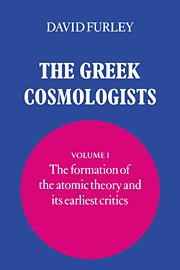Book contents
- Frontmatter
- Contents
- Preface
- 1 Two pictures of the world
- 2 The judgement of Socrates
- 3 The beginning in Miletus
- 4 Two philosophical critics: Heraclitus and Parmenides
- 5 Pythagoras, Parmenides, and later cosmology
- 6 Anaxagoras
- 7 Empedocles and the invention of elements
- 8 Later Eleatic critics
- 9 Leucippus and Democritus
- 10 The cosmos of the Atomists
- 11 The anthropology of the Atomists
- 12 Plato's criticisms of the materialists
- 13 Aristotle's criticisms of the materialists
- Bibliography
- Index of passages
- General index
10 - The cosmos of the Atomists
Published online by Cambridge University Press: 27 January 2010
- Frontmatter
- Contents
- Preface
- 1 Two pictures of the world
- 2 The judgement of Socrates
- 3 The beginning in Miletus
- 4 Two philosophical critics: Heraclitus and Parmenides
- 5 Pythagoras, Parmenides, and later cosmology
- 6 Anaxagoras
- 7 Empedocles and the invention of elements
- 8 Later Eleatic critics
- 9 Leucippus and Democritus
- 10 The cosmos of the Atomists
- 11 The anthropology of the Atomists
- 12 Plato's criticisms of the materialists
- 13 Aristotle's criticisms of the materialists
- Bibliography
- Index of passages
- General index
Summary
The infinite universe
It is particularly important, when writing about the Atomists, to be consistent in making the distinction between the universe or ‘the all’ (to pan, in Greek) and the world (kosmos) – that is, a particular part of the universe consisting of our earth, sea, air, and visible stars, planets, moon, and sun. Leucippus and Democritus held that ‘the all’ consists of an unlimited expanse of void space and an unlimited number of atoms. Of these, some are – temporarily – arranged so as to form worlds, including the world in which we live. We must study, first, the arguments used to defend the notion of the unlimitedness of the universe, and then the mechanisms that were suggested to account for the formation of worlds.
If we are to understand the controversy of classical antiquity, we must keep clearly in mind one important difference between ancient and modern cosmology. In the twentieth century we have grown accustomed to the notion that what we see in the sky on a starry night is the beginning of a universe that continues far beyond the limits of our vision. We can see some of the stars, because they are relatively large, bright, and near; with telescopes we can see further into the distance and see more stars, and with better telescopes we could see further still. In the cosmology of classical antiquity, on the other hand, it was a matter of common agreement that the stars we see are part of our world: they are the boundary beyond which the infinite universe (if it is infinite) begins.
- Type
- Chapter
- Information
- The Greek Cosmologists , pp. 136 - 151Publisher: Cambridge University PressPrint publication year: 1987



